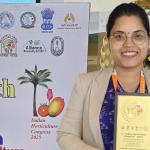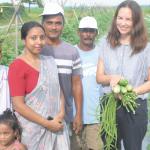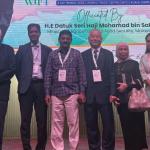Gendered Needs Assessment in Assam and Odisha
In order to address the context-specific vulnerabilities and challenges faced by women farmers in the project sites, conducted Gender Needs Assessments by engaging with women smallholders to co-develop gender-responsive strategies to improve their adaptive capacities. The GNA in Assam was conducted in Nagaon district on 27th May 2025 in collaboration with Assam Agricultural University, and in Puri district in Odisha on 10th June 2025 in collaboration with Odisha University of Agriculture and Technology (OUAT). Thirty-five women farmers in Assam and twenty-eight farmers from Odisha participated in the assessments. The assessments were facilitated by Dr. Anamika (Principal Scientist–Gender, MSSRF) in Assam and Ms. Surajita Turuk (Development Coordinator–Gender, MSSRF) in Odisha.
The needs assessment revealed that enhancing the adaptive capacities of women farmers to climate change requires addressing the following structural challenges:
- Inequitable access to climate-smart technologies: Women shared that climate change poses new challenges to pest management due to its impact on pest populations, variants, and distribution. The indigenous pest management strategies currently practiced by smallholder farmers are becoming ineffective. In the absence of climate-smart technologies designed for effective nutrient and pest management, smallholder farmers face severe crop losses.
- Limited access to climate information and agricultural advisories: Women farmers reported that climate change and extreme weather events have significantly impacted their farming practices. For instance, untimely rains cause delays in planting or lead to spoilage and destruction during harvesting. In the absence of scientific knowledge on how to adapt to these challenges, many of them left their land uncultivated, which in turn affected their household incomes and food security.
- Poor control over land, water, and credit: Even though women play a major role in agriculture, they lack ownership and control over productive assets and credit. Women are unable to make decisions on investments in drudgery-reducing machinery, pest control technologies, or climate solutions like better irrigation systems. As a result, crops managed solely by women farmers, such as vegetables, are prone to severe losses caused by pest attacks.
- Restricted role in decision-making: Women rarely make independent decisions on farm operations. Most of them shared that they follow the instructions of male family members on aspects related to farming, such as adopting climate-resilient varieties, choosing technologies, or selecting pest management solutions.
- Time poverty: Our conversations also revealed that women farmers face the triple burden of agricultural production, social reproduction, and community management—all under conditions of resource scarcity. Women are expected to juggle their responsibilities as farmers and domestic caregivers without much support. As a result, many of them shared experiences of exhaustion and stress, especially during peak agricultural seasons.
- Restricted mobility: Due to gender-based restrictions on mobility, women lacked access to institutional support, social networks, and services provided by government and non-government organizations. They expressed that they are unable to attend training sessions, workshops, or field demonstrations conducted by the agricultural department or other agencies due to mobility restrictions or household care responsibilities.
Based on the GNA, we will develop a detailed gender-inclusive approach with specific inputs and outcomes. We will also encourage the active participation of women in the upscaling process, drawing on the gender analysis already conducted and insights from the RESILIENCE project, by adopting context-specific strategies.







